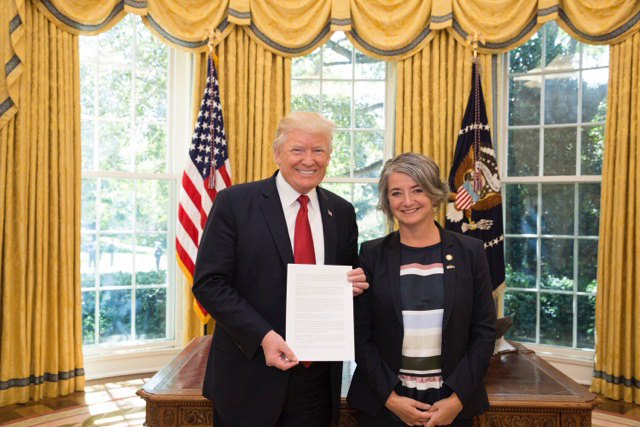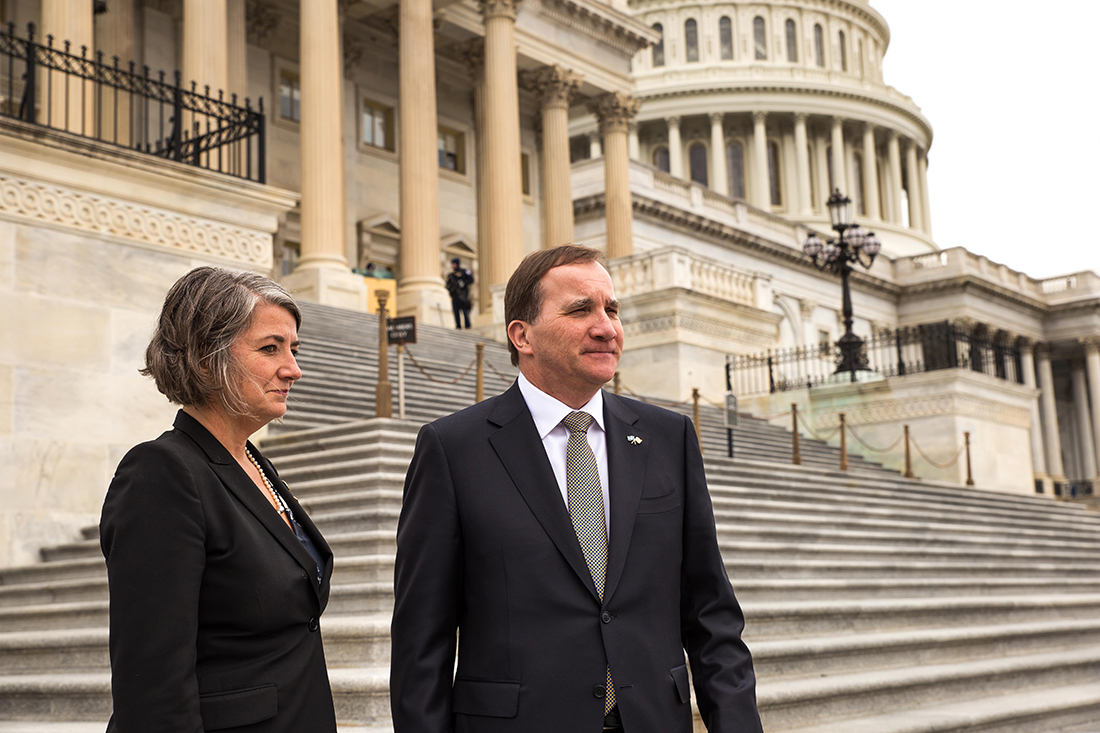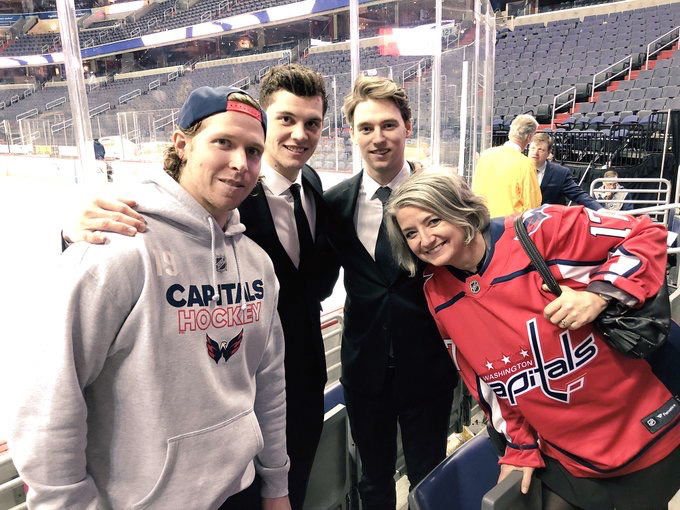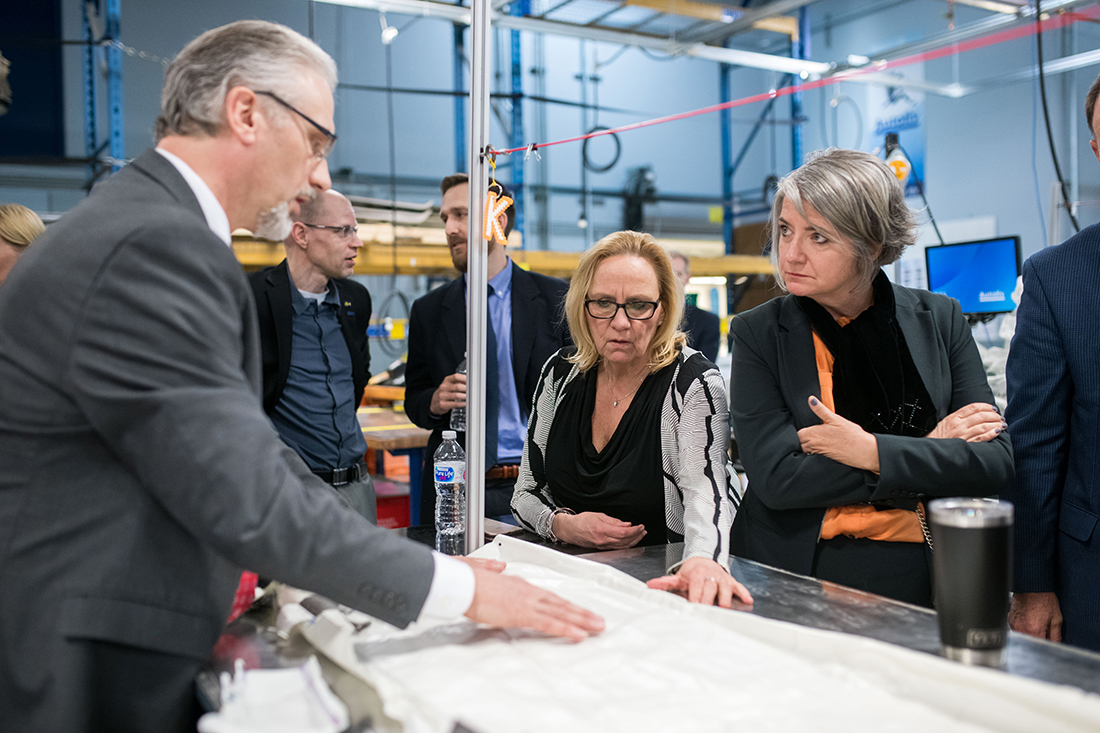It's about people
Sweden’s ambassador in Washington, DC is relaxed as we meet in her office in March. Karin Olofsdotter, just back after a luncheon with the artist Siri Berg who’s exhibiting at House of Sweden, is as interested in hearing my take on the artist and a variety of other contemporary subjects as she is in talking about her own experiences in office.
-
 President Trump had only nice things to say about Sweden as Sweden's new ambassador to the United States, Karin Olofsdotter, offered her credentials her first month on the job in 2017.(And, quite frankly, what else is there to say ..?)
President Trump had only nice things to say about Sweden as Sweden's new ambassador to the United States, Karin Olofsdotter, offered her credentials her first month on the job in 2017.(And, quite frankly, what else is there to say ..?) -
-
This is a defining attribute of our current representative in DC: a never-ending curiosity and genuine interest in people and, as it seems, most things.
Before arriving in DC the ambassador was Director-General for Trade at the foreign office in Sweden, following three years as ambassador to Hungary. Previous experience also includes two years as head of the Department for Promotion of Sweden, Trade and CSR in Stockholm.
Olofsdotter was nevertheless surprised at her appointment after but a year in her previous position: “Becoming Sweden’s ambassador to the United States is just not something you expect. I have to pinch myself sometimes on my way to the office, reminding myself ‘I am the ambassador,’” she says.
Sweden’s first female ambassador to the United Sates—a fact duly noted by President Trump as she offered her credentials her first month on the job—brings a great deal of substance to the task. Ambassador Olofsdotter, 52, has a BA in psychology, economics and Russian from Lund University, studied at UCLA Anderson School of Management and speaks Russian, French and English. Her first post after entering the Foreign Service was in Moscow, where she was mainly responsible for covering Belarus. Her list of assignments also includes work with the Swedish delegation to NATO, the Swedish EU representation in Brussels and a term at the Washington Embassy as Deputy Chief of Mission. -
 With Swedish Prime Minister Stefan Löfven at the Capitol.
With Swedish Prime Minister Stefan Löfven at the Capitol. -
-
People and travel
Olofsdotter has already visited many of the honorary consuls in the U.S. after moving to DC with her daughter in September 2017; her husband stayed in Sweden with their son to allow him to finish high school. Travel seems to be in her blood—she was an exchange student in the U.S. during both high school and college, and she spent time abroad for several jobs.
“Traveling is really the most exciting part of my job, being out there, visiting new places and meeting people. I’m going to Texas next week and meeting with the governor in Austin.”
The ambassador hails from Halmstad on Sweden’s west coast where her parents owned and ran shoe stores in several mid-sized cities. “Coming from a family of entrepreneurs enables me to understand what businesses go through, their needs, their hardships and how they think.“
Her family background, along with experiences from previous jobs, has surely formed the professional she is today. And temporary work in the Swedish healthcare system during studies at Lund University left a formidable impression on her, too: “Working with people from all parts of society struggling with drugs and alcohol, realizing the impact of addiction and abuse was an important experience I wouldn’t want to have undone.” -
 Visiting with Swedish players at the Capitals hockey team.
Visiting with Swedish players at the Capitals hockey team. -
“Folk är folk”
We’re curious to know whether much has changed since Olofsdotter entered the Swedish Foreign Service in 1994.
“Little has really changed over the last 25 years—it’s (still) about people, about staying relevant and getting to know people. As I read Wilhelm Wachtmeister’s [Sweden’s ambassador to the U.S. 1974-1989] biography last summer I was again taken by the fact that so little has changed over the years since his time and since I started at the Foreign Office. To succeed as a small nation in Washington, you have to have knowledge on the actual issues, but also be socially active.”
“Folk är folk, people are people, to paraphrase something Jan Eliasson (ambassador to the U.S. 2000-2005) mentioned on Swedish Radio in the summer of 2015. He explained how during intense dramatic negotiations during the Iran-Iraq wars they made people stay in the room and slowly start talking to each other by putting a coffee machine at the exit from the conference room.…”
The mention of the Swedish diplomat brings to mind conversations with Ambassador Jan Eliasson when he received the go ahead on plans to develop the property for the embassy in 2001. (Karin Olofsdotter was at the time working in Brussels where she chaired the EU’s Political-Military Group.) Since Sweden was chairing the EU nations and represented them all in DC, Eliasson said, “All of a sudden the phone is picked up, my phone calls are returned. Everyone is accessible on every level. Representing [at the time] 15 nations instead of one small country makes all the difference.”
Other things have changed since then: The presiding nation no longer represents the group abroad, an honor and work load instead bestowed upon the EU ambassador’s office. So, do officials in the administration still respond when a small nation such as Sweden knocks on the door? -
 Corporate visit at Swedish international company Autoliv in Michigan.
Corporate visit at Swedish international company Autoliv in Michigan. -
Yes, says Olofsdotter, as long as there’s a good reason. “What you want to avoid is constantly nagging people for attention. We’ve had a few reasons to contact the administration. Of course in conjunction with the Trump administration’s negotiations with North Korea - Sweden is the protecting power of the United States in North Korea - but also in conjunction with the Russia sanctions that specifically hit Sweden’s only aluminum plant Kubal (Kubikenborg Aluminium), owned by RusAL, which could have been forced to close due to the U.S.-Russia sanctions. This brought us high up in the Treasury Department.”
[The Kubal plant in Sundsvall with 500 employees is one of the biggest employers in the area, and was saved from closing by a decision in Congress in mid-January. The agreement is, however, dependent on the Russian oligarch Oleg Deripaska coming through on reducing his ownership and relinquishing control in RusAL and its parent company.]
Ambassador Olofsdotter's present position is no doubt the cream of the crop of Foreign Office assignments, and she is relatively young, so what’s next?
“I don’t look at this position as the crowning point of a career or a final destination. There are so many exciting places in the world I’d love to see and get to know. Also, while my parents are still around I would welcome an opportunity to serve in one of our Nordic countries to be closer to them and other family.” It's all about people. -
Most exciting, memorable event of the year? It wasn’t meeting with President Trump, who at their meeting had only nice things to say about Sweden, but it was the bilateral meeting of April 2018 between the Trump administration and Prime Minister Stefan Löfvén.
-
Ulf Barslund Martensson
-
-
